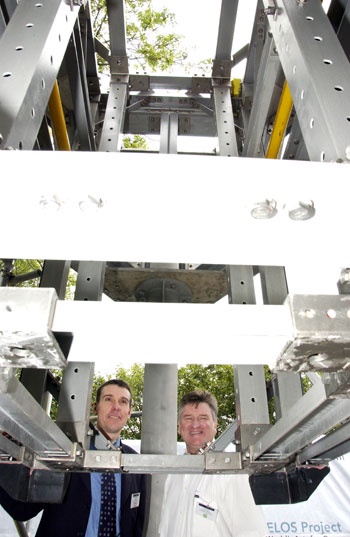The world’s first system to monitor deep-sea marine life in the long-term is unveiled at the University of Aberdeen today (September 12).
In a pioneering link up involving industry and leading scientific organisations, two massive environmental monitoring platforms have been constructed for BP for installation on the ocean floor at 1400m depth off Angola.
As well as acting as an environmental gauge for BP, these subsea platforms will help unravel many of the mysteries of the deep, observing the activity patterns of unusual creatures, rarely studied before, in their natural environment.
World demand and technological advances have prompted the hydrocarbon industry to extend into deeper waters where little is known about environmental impacts on marine animals.

The platforms - each as heavy as the ocean's largest living fish, the whale shark, which can weigh in at 12 tonnes – are being placed in BP's Block 18. One will be sited near field – within 50 metres of a wellhead - and the other five miles from any offshore activity. The second platform will act as a control with data gathered here compared with data gathered near field.
Jim Clarke, Project Manager of Local Environmental Impact at BP, said: "BP has a substantial portfolio of assets in deep water areas which is growing all the time. Technological developments are allowing us to explore in deeper and deeper water.
"However, at the same time, there is limited understanding of impacts beyond the Continental Shelf, both from the industry side as well as within the scientific community. We hope DELOS will go some way to redress that."
Professor Monty Priede, Director of the University of Aberdeen's Oceanlab, said: "I am sure that DELOS will enable us to make fundamental new scientific discoveries about life in the deep sea."
Novel technologies have been used to create DELOS which has to be robust enough to withstand the enormous pressure that comes from being 1400 metres below the surface.
The platforms comprise two parts - a sea floor docking station that remains on the sea floor - and a number of removable observatory modules that are designed to perform specific environmental monitoring functions.
The modules have been designed to have sufficient capacity and battery power to function for six months. Remotely operated vehicles will then recover modules from the docking stations and take them to the surface to allow data to be fed to scientists and for servicing of the modules.
Dr Phil Bagley of Oceanlab is responsible for the design of DELOS which has been created using non-corrosive glass reinforced plastic which has never before been used at these depths and in this way. Over 10,000 super duplex bolts have been used to connect up the components.
DELOS is a collaboration involving BP; the University of Aberdeen's Oceanlab; National Oceanographic Centre in Southampton; University of Glasgow; Monterey Bay Aquarium Research Institute in California; Texas A&M University and the Angolan National Institute of Fisheries Research (Instituto Nacional de Investigação Pesqueira - INIP).


